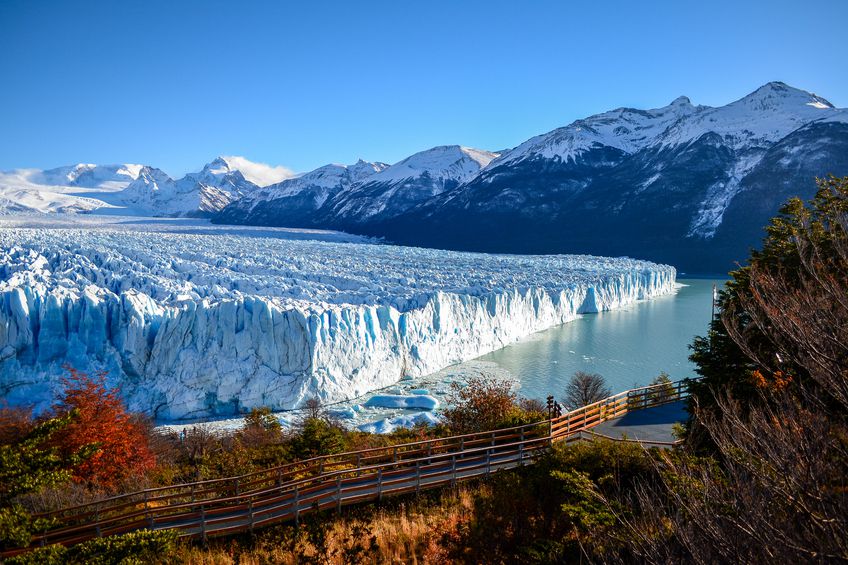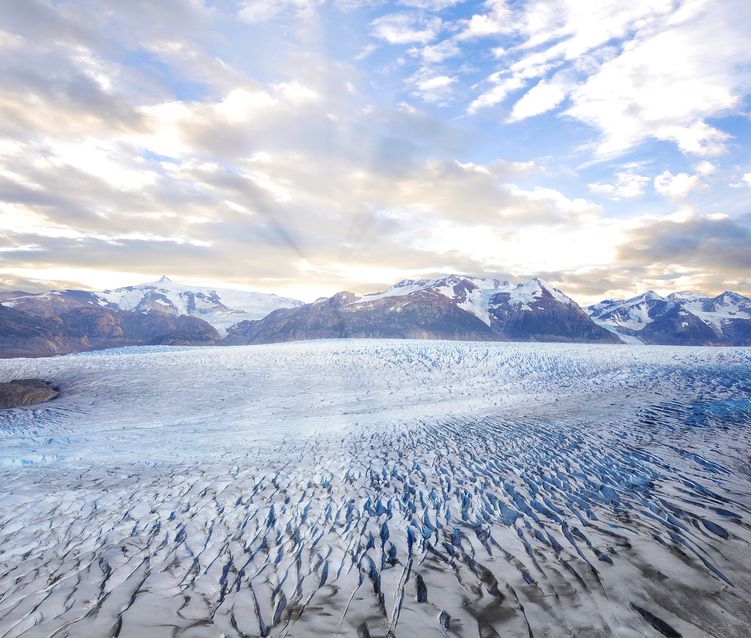Storing around 75% of the globe’s freshwater, glaciers are the lifeblood of our planet. There are more than 300 glaciers in Patagonia, an many are well-known to Argentinians and adventurers. But how many of Patagonia’s famous glaciers do you know?
Perito Moreno, Argentina
Size: 97 sq. miles (156-sq.km). It is 19 miles (30km) long and 240 ft. (72m) high.

Not only is Perito Moreno Argentine Patagonia’s top tourist attraction, it is also one of the region’s most famous glaciers.
Visitors flock to the area, especially to see the epic ice rupture of the glacier which occurs every four to five years. This natural spectacle occurs when the advancing ice cuts off a section of the lake it feeds into. Water pressure is forced through creating an archway of ice which then collapses in a dramatic explosion of ice and water.
Perito Moreno is an essential stop for anyone interested in glacier watching. If it’s on the list, don’t miss these 10 amazing Perito Moreno glacier facts.
How to visit?
Tours from nearby El Calafate are the easiest way to visit Patagonia’s most famous glacier.
Pío XI, Chile
Size: 50 miles (80km) long, with a front face of around 3.7 miles (6km) and a height of approximately 250 ft. (76m).
Chilean glacier Pío XI, is the longest glacier in the southern hemisphere, outside Antarctica. (The largest glacier in the world is Lambert Glacier in Antarctica.)
This glacier is of great interest to climate change scientists, it is the only glacier that continues to advance, it advanced extensively in the 20th century – a rarity given that most famous glaciers are melting. In all of Patagonia, only Perito Moreno and Pío XI are classified as stable.
How to visit?
Get to Pio XI by sea from Puerto Natales, a city located 3 hours from Punta Arenas.
Grey, Chile
Size: 100 sq. miles (270km²). It is 17 miles (28km) long, 4 miles (6km) wide, 100 ft. (6m) tall.

This Chilean glacier is located in a region entirely shaped by glaciation – the granite towers of Torres del Paine National Park are the result of this process – it is one of the most dramatic sights to encounter in Patagonia. With a backdrop of snow-peaked mountains and bobbing icebergs in the aquamarine waters of Lago Grey in the foreground, it is truly breath-taking.
How to visit?
Glacier Grey is best viewed from the John Gardner Pass when hiking the ‘O’ Circuit or ‘Q’ trek, or from Refugio Grey, which is visited by all three hikes that pass through Torres del Paine National Park.
Queulat Hanging Glacier, Chile
Size: Unknown
A little-known Chilean glacier in Queulat National Park, the Ventisquero Colgante or Hanging Glacier is a spellbinding sight. (A hanging glacier is one type of glacier, the are nine types of glacier.) Literally clinging to the cliff edge, its melting glacial waters spill from the densely-packed blue ice, transforming into a waterfall that streams into milky-white Laguna Tempanos beneath.
It is not as large as its glacier cousins, but it is one of the most captivating sights in all of Patagonia.
How to visit?
Take a tour or drive 12 miles (20km) south of Puyuhuapi on the Carretera Austral to arrive at the park’s entrance. From here, follow a short path up to a lookout that directly faces the glacier.
Ever wondered Why are glaciers white? Are they? Find out more in the ultimate glacier fact guide.
Find out more about the 9 fascinating types of glaciers here!
No comments yet
There are no comments on this post yet.






Leave a comment